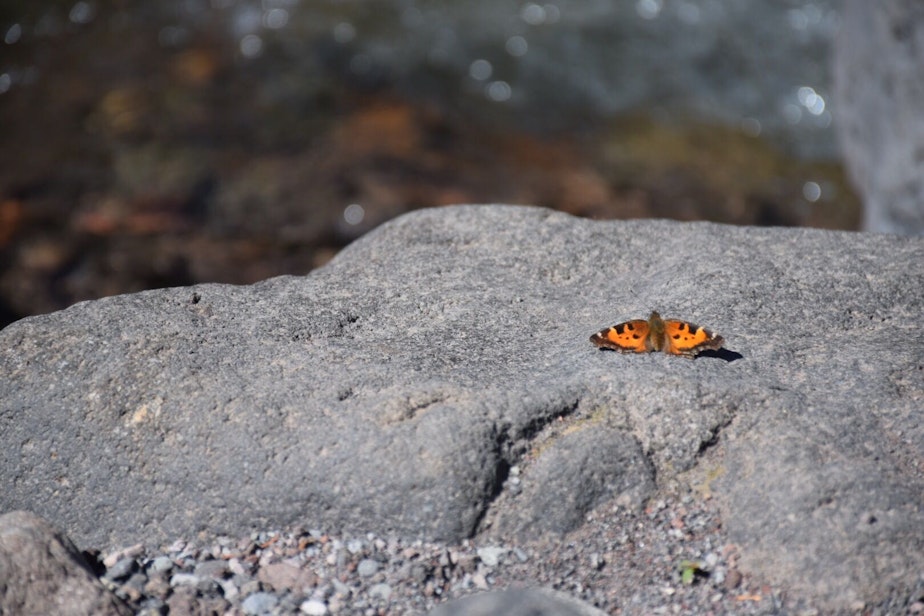From the KUOW archives: Poet Mary Oliver celebrates life, nature and her dog

On November 8, 2005, people lined up at Town Hall Seattle to hear a rare reading by poet Mary Oliver.
It was a sold-out crowd, exuberant when Oliver would announce favorites from the stage.
We dug into our KUOW archives and found excerpts from that night along with commentary by former Washington State poet laureate Elizabeth Austen, hosted by Megan Sukys.
Oliver died Thursday of lymphoma at the age of 83.
Austen talked to people at this Seattle event and found out a special trait of Oliver’s poems: People heard of her work because it passed hand to hand, friend to friend.
“This is not among poetry people, this is just among people who find her poems useful for their lives,” Austen said. “She speaks directly to some of our most intimate concerns as human beings, and she does it in language that is very accessible, that invites the reader in.”
Sponsored
Wild Geese
Mary Oliver reads her poem 'Wild Geese' at Town Hall Seattle on November 8, 2005.
Whoever you are, no matter how lonely,
the world offers itself to your imagination,
calls to you like the wild geese, harsh and exciting —
over and over announcing your place
in the family of things. (excerpt)
“There’s such an intimate authority about her voice, and I felt as if she was speaking directly to me something I needed to hear in order to be brave and to go out into the world,” Austen said of the poem.
The Summer Day
Mary Oliver reads "The Summer Day" at Town Hall Seattle on November 8, 2005.
Sponsored
This grasshopper, I mean-
the one who has flung herself out of the grass,
the one who is eating sugar out of my hand,
who is moving her jaws back and forth instead of up and down-
who is gazing around with her enormous and complicated eyes. (excerpt)
“She pays such careful attention to the details of the natural world," Austen said.
“She deals with big abstract questions about what it means to be alive, but she always does it through concrete sensory detail, so we can feel and see and smell and taste the particulars of the poems. And that gives us room to engage in them imaginatively.
“It also means that we feel included in the poems, we don’t waste a lot of time trying to figure out, ‘What is she really trying to say?’ She lets us in on the poem."
Some Things, Say The Wise Ones
Mary Oliver reads 'Some Things, Say The Wise Ones' at Town Hall Seattle on November 8, 2005.
Sponsored
Some things, say the wise ones who know everything,
are not living. I say,
You live your life your way and leave me alone. (excerpt)
“She does not cotton to this belief that we are somehow superior to the animals. She would say we’re not even superior to the stones on the beach. That’s very much the ethos of her work,” Austen said.
Mindful
Mary Oliver reads 'Mindful' at Town Hall Seattle on November 8, 2005.
Everyday
I see or hear
something
that more or less
kills me
with delight (excerpt)
“I really hear that as a call to slow down and to notice what’s around us. I think that the pace at which we go, which seems to accelerate every year, is inhuman.
“I think that’s part of what her poems are saying as well: Slow down, look around, the world is astonishing,” Austen said.
The Percy Poems
Mary Oliver reads three poems about her dog, Percy, at Town Hall Seattle on November 8, 2005.
I would like to take him to Washington, right into
the oval office
where Donald Rumsfeld would crawl out of the president's armpit
and kneel down on the carpet, and romp like a boy.
For once, for a moment, a rational man. (excerpted from "Percy Two")
“They contradict the idea that poetry is always heavy and about massive, huge subjects. But also underneath each of these poems, there still are those big questions, she’s just putting them in a different kind of package.
“It’s subversive in the best possible way,” Austen said.
This interview originally aired on KUOW Dec. 11, 2005, and Dec. 18, 2005.
Reproduced for the web by Kara McDermott.




